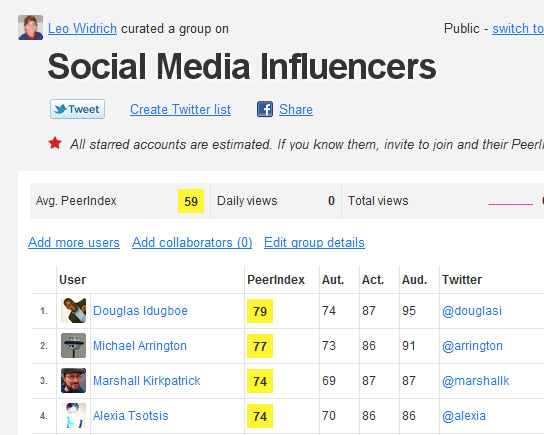Do Klout and Peerindex Really Matter?
They are amongst the most hotly discussed topics in the Social Media scene at the moment. How much Klout do you have? What’s your PeerIndex score? – are common questions that circle in the Social Media universe.
Some fiercely deny any relevance of such scores, while others appear to see it as a make or break to build a relationship with a user. So before we go any further:
What do these scores actually measure?
1) Peerindex:
 From my research PeerIndex boasts the more detailed and more useful score. Their analysis takes into account up to 5 different Social Networks including Twitter, Facebook, Quora, Linkedin and your blog.
From my research PeerIndex boasts the more detailed and more useful score. Their analysis takes into account up to 5 different Social Networks including Twitter, Facebook, Quora, Linkedin and your blog.
What I particularly like is how they split their measurement up in different “resonance topics” you are influential in. Further analysis include the level of your activity, which is obviously important to measure influence.
The “Audience Score” measures how receptive your audience is for the content you are providing, which is another very thoughtful point to measure.
2) Klout:
 Klout on the other hand first of all only allows for integration with Twitter and Facebook. Their measurement is in general very heavily Twitter only focused.
Klout on the other hand first of all only allows for integration with Twitter and Facebook. Their measurement is in general very heavily Twitter only focused.
I also found that your Klout mostly relies on all engagement going on. How many people click your links and who clicks. Who retweets, @’s, follows, lists you and how often? Hence it is largely dependent on your activity on Twitter and the interaction with you and others.
My conclusion is that PeerIndex overall provides the more useful score as it goes across the whole web and categorizes very smartly in various topics. For purely Twitter related purposes I believe Klout boasts a more accurate measurement.
Why do these scores matter?
Although in the early stages, I believe that making use of PeerIndex or Klout can be very helpful. Of course being obsessed with the bare number is not an approach that is recommended.
Yet doing it the other way round and seeing the number as a result of what and how you interacted in the past is very valuable. It immediately gives you a rough idea about how well connected, informed and engaged a certain person is.
Especially something like PeerIndex’ group feature, which allows you to feed your Twitter lists or other curated lists in to rank them via their scores makes organizing and interacting a lot easier:

How could this be used in the future?
One use case I saw was that companies use your score after you issued a complaint or feedback to weigh how important your response was. If this is recommendable is questionable, yet it shows how these measurements can bring structure to the web in a new way.
Another one is that it might become a powerful source of traffic in the future. If we see PeerIndex and Klout as a search engine for people in which you rank in the top it will help you to get found for your expertise.
Of course these scores will never replace word of mouth and relationships that come from the engagement itself. Yet I believe they can be a powerful add-on to order quality and make for better results in your search for people to collaborate with.
Over to you now. What is your experience with these scores? Do you think PeerIndex and Klout can be helpful in the future for you?
About the author:
Leo Widrich is Co-founder of a Twitter App called BufferApp, which allows you to tweet more often without flooding your followers. He blogs more Twitter Tips here, say hi @LeoWid anytime.


I agree Leo, Klout is more twitter specific but one another problem is that it fails to add your facebook fanpage though its still in a beta phase. For eg: i am more interested to know stats about my fanpage rather than my profile page. So i am not that a big fan of klout anymore but i do have a feeling that it’s being hyped a bit more. Peerindex, i have used couple of times but need some more time before I comment on it but by reading your post I am excited to try(maybe a review will be best, wht say ?) Rest did you had a chance to check sproutsocial, if not then you should…its cool.
thanks for a lovely post 😉
I think there is a good case to have indexes that you can refer to but like you suggest obsessing about the numbers doesn’t really help you. I really think everyone likes to feel comfortable in the safety of their own box and both give you that feeling.
Good post. I like Klout better than Peerindex.
Wanted to thank you for this informative post. While I’m familiar with Klout, I appreciate you easy to understand description of Klout. Peerindex is new to me so I’m going to check that out. Are you familiar with the Hubspot graders (FB, Twitter, Blog) if so what are your thoughts. Could be your next blog post.
Lisa Ann Landry – Corporate Trainer
I’m an exuberant force of light… Come light up your life
http://www.imagedevelopmentgroup.com/speakers.html
@Prasant,
Thanks for another great comment bro! Much appreciated. Yes, Klout is hyped a bit more indeed, there marketing is great.
Absolutely explore Peerindex and have a look, it is great.
@Chris,
Thanks for stopping by. Absolutely you need to be simply comfortable and the score is only a rough score then.
@Kelsey,
Thanks for your comment, yes I think Klout is great indeed.
@Lisa,
Awesome, no, I haven’t heard about Hubspot graders, but it sounds fantastic, will check it out. Glad you liked the post!
Awesome, no, I haven’t heard about Hubspot graders, but it sounds fantastic, will check it out. Glad you liked the post
Awesome, no, I haven’t heard about Hubspot graders, but it sounds fantastic, will check it out. Glad you liked the post
Hey Leo, Klout just came out with the +K which looks really interesting and I watched a great interview Robert Scoble did with them. Klout Perks are being used for local giveaways to movies and other events. What’s good about that is that big brands are creating campaigns that are focused on users with mid-range scores rather than high ranking Klout users who already get perks anyway.
Thanks for the info about PeerIndex too.
What’s good about that is that big brands are creating campaigns that are focused on users with mid-range scores rather than high ranking Klout users who already get perks anyway.
Thanks for the i
Klout is currently a bit of a blunt instrument – some university researchers recently showed that even a ‘bot’ could get a good Klout score if it tweeted often enough.
Obviously a company shouldn’t rely entirely on Klout for a media campaign – if, for example, they wanted to promote a London-based movie then they should be doing research on all of the Londoners who tweet/blog about film if they want to have the maximum impact.
I prefer Klout over Peerindex because they are doing a great job with Klout Perks. For example, they gave me free movie tickets and free U.S. invites for Spotify. There are still some available at:
http://t.co/ltb5cMe